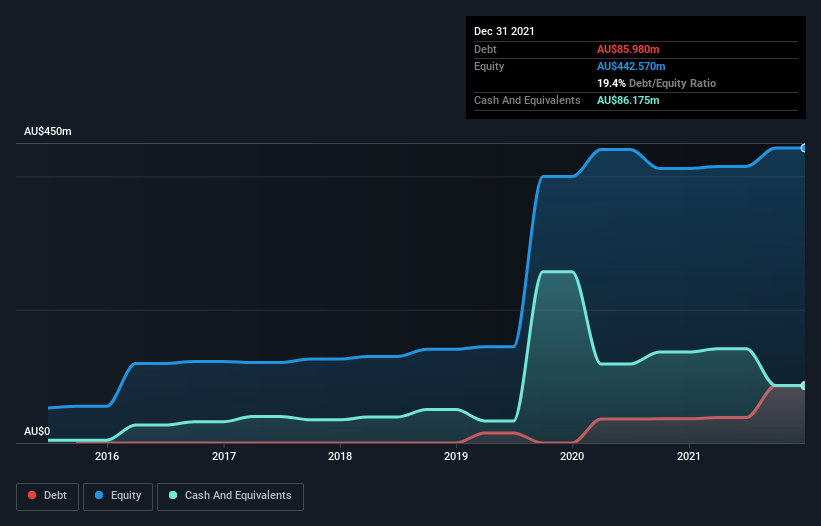Is EML Payments (ASX:EML) Using Too Much Debt?
Some say volatility, rather than debt, is the best way to think about risk as an investor, but Warren Buffett famously said that 'Volatility is far from synonymous with risk.' So it might be obvious that you need to consider debt, when you think about how risky any given stock is, because too much debt can sink a company. We can see that EML Payments Limited (ASX:EML) does use debt in its business. But should shareholders be worried about its use of debt?
What Risk Does Debt Bring?
Generally speaking, debt only becomes a real problem when a company can't easily pay it off, either by raising capital or with its own cash flow. If things get really bad, the lenders can take control of the business. However, a more common (but still painful) scenario is that it has to raise new equity capital at a low price, thus permanently diluting shareholders. Of course, the upside of debt is that it often represents cheap capital, especially when it replaces dilution in a company with the ability to reinvest at high rates of return. The first step when considering a company's debt levels is to consider its cash and debt together.
Check out our latest analysis for EML Payments
How Much Debt Does EML Payments Carry?
You can click the graphic below for the historical numbers, but it shows that as of December 2021 EML Payments had AU$86.0m of debt, an increase on AU$36.2m, over one year. However, it does have AU$86.2m in cash offsetting this, leading to net cash of AU$195.0k.
How Strong Is EML Payments' Balance Sheet?
The latest balance sheet data shows that EML Payments had liabilities of AU$2.18b due within a year, and liabilities of AU$148.2m falling due after that. Offsetting these obligations, it had cash of AU$86.2m as well as receivables valued at AU$63.3m due within 12 months. So its liabilities total AU$2.17b more than the combination of its cash and short-term receivables.
This deficit casts a shadow over the AU$543.4m company, like a colossus towering over mere mortals. So we definitely think shareholders need to watch this one closely. After all, EML Payments would likely require a major re-capitalisation if it had to pay its creditors today. EML Payments boasts net cash, so it's fair to say it does not have a heavy debt load, even if it does have very significant liabilities, in total.
The bad news is that EML Payments saw its EBIT decline by 19% over the last year. If that sort of decline is not arrested, then the managing its debt will be harder than selling broccoli flavoured ice-cream for a premium. The balance sheet is clearly the area to focus on when you are analysing debt. But it is future earnings, more than anything, that will determine EML Payments's ability to maintain a healthy balance sheet going forward. So if you want to see what the professionals think, you might find this free report on analyst profit forecasts to be interesting.
Finally, a company can only pay off debt with cold hard cash, not accounting profits. While EML Payments has net cash on its balance sheet, it's still worth taking a look at its ability to convert earnings before interest and tax (EBIT) to free cash flow, to help us understand how quickly it is building (or eroding) that cash balance. Looking at the most recent three years, EML Payments recorded free cash flow of 36% of its EBIT, which is weaker than we'd expect. That's not great, when it comes to paying down debt.
Summing up
Although EML Payments's balance sheet isn't particularly strong, due to the total liabilities, it is clearly positive to see that it has net cash of AU$195.0k. However, we do find both EML Payments's level of total liabilities and its interest cover troubling. So despite the cash, we do think it carries some risks. The balance sheet is clearly the area to focus on when you are analysing debt. However, not all investment risk resides within the balance sheet - far from it. Case in point: We've spotted 4 warning signs for EML Payments you should be aware of.
If you're interested in investing in businesses that can grow profits without the burden of debt, then check out this free list of growing businesses that have net cash on the balance sheet.
Have feedback on this article? Concerned about the content? Get in touch with us directly. Alternatively, email editorial-team (at) simplywallst.com.
This article by Simply Wall St is general in nature. We provide commentary based on historical data and analyst forecasts only using an unbiased methodology and our articles are not intended to be financial advice. It does not constitute a recommendation to buy or sell any stock, and does not take account of your objectives, or your financial situation. We aim to bring you long-term focused analysis driven by fundamental data. Note that our analysis may not factor in the latest price-sensitive company announcements or qualitative material. Simply Wall St has no position in any stocks mentioned.

 Yahoo Movies
Yahoo Movies 

